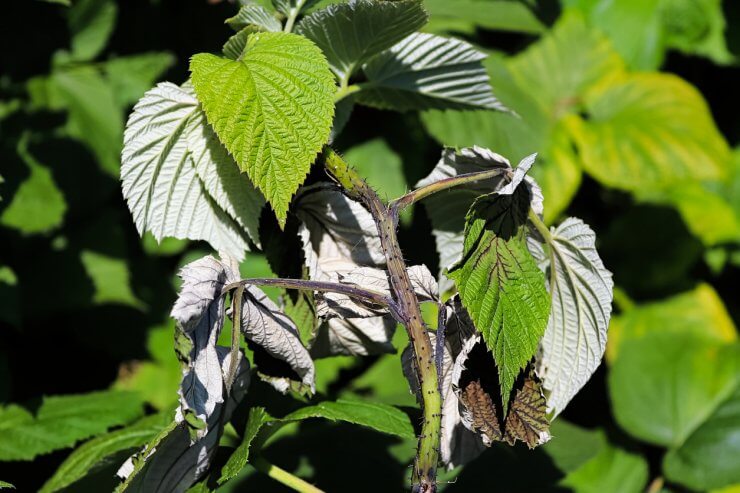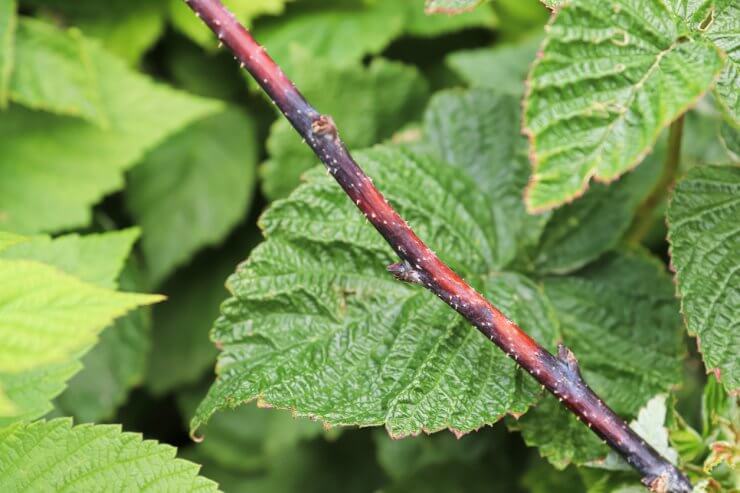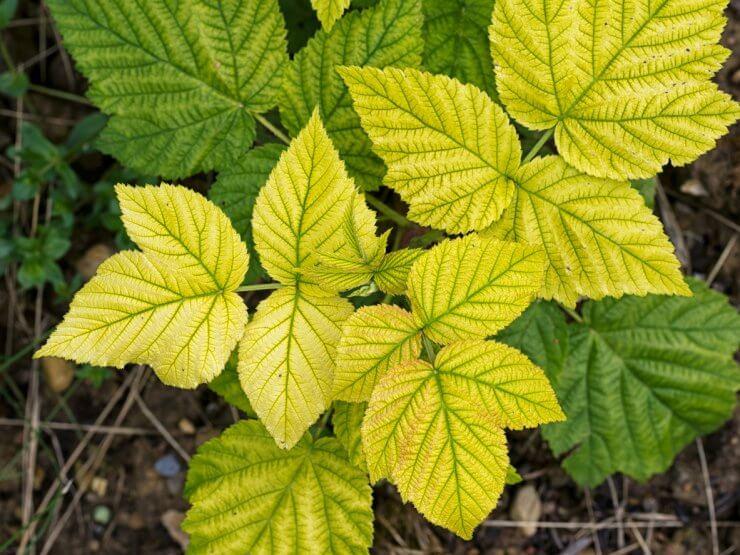
Raspberry plant affected by cane blight
Raspberry plant diseases are caused by bacteria, fungi, and viruses. The diseases can spread through the soil, water, air, infected tools, animals, and even gardeners themselves.
Spot diseases on your raspberry plants sooner so you can treat plants before they are destroyed by disease and can successfully manage symptoms. Here is a three-step approach to keeping vigilant about the presence of raspberry plant diseases:
- Research the Risks. Find out about raspberry diseases that are prevalent in your geographic area. When possible, buy disease-resistant raspberry plant varieties to avoid diseases in the first place—many hybrid raspberry varieties have been specifically designed to resist certain diseases.
- Examine Plants Daily. Check your raspberry plants every day to be sure no disease symptoms are present or emerging.
- Spot Diseases Early. Catch and treat disease quickly so your plants can recover and thrive.
Raspberry diseases can affect the foliage, stems, and fruit. Here is what to look for to spot possible infection:
Raspberry leaves—possible disease symptoms:
- powdery white growth on underside
- puckering or curling
- wilting

Raspberry cane with blight
Raspberry stems (canes)—possible disease symptoms:
- lesions that are brown, gray, or white
- dark brown or purplish cankers
- wilting
- dying before flowering or fruiting
- dry, brittle
- stunted growth
Raspberry fruit—possible disease symptoms:
- powdery growth
- berries fail to mature or are seedy
- mold or mildew
- brown, dried-up fruit
- low yield
Make your own natural disease and pest control spray with benign materials. Mix one tablespoon of baking soda, 1/2 teaspoon of a mild dish detergent, and 2 1/2 tablespoons of olive oil in a gallon of water to make a solution that will repel all kinds of bugs, as well as a fungicide for blight and mildew on the raspberry plant leaves. Shake it well in your bottle before spraying, and repeat every week for it to be continuously effective.
We’re believers in not using toxic materials in the garden—they can hurt the plants, hurt the soil, damage the environment, and harm you.
Preventive measures to avoid raspberry plant diseases
Try some of these techniques for avoiding raspberry diseases in the first place:
Choose planting location carefully
Avoid planting raspberry where you have previously planted crops such as potatoes, peppers, eggplants, strawberries, or other raspberries. They are susceptible to the same diseases and many bacteria, fungi, and viruses live in the soil for years, just waiting to prey on your raspberry plants!
Avoid planting the same crops nearby, as having them in the area could facilitate rapid spread of any developing disease.
Improve your soil composition

Chlorosis of raspberry leaves
Before planting your raspberries, add a good amount of compost or organic matter to improve the soil. Extra nutrients and good aeration help grow stronger plants that will resist disease and infection.
Plant disease-resistant raspberry varieties
Many hybrid raspberry varieties have been developed specifically to resist particular raspberry diseases. You can plant disease-resistant raspberry varieties to always have the healthiest plants and harvest.
Water your garden properly
Don’t underwater or overwater your raspberry plants. By keeping a regular watering schedule, you’ll keep your plants vibrant and healthy. Overwatering and watering directly on the plants—instead of the preferred watering method, directly at the stem on the soil—leads to consistently wet conditions, which allows bacteria, fungi, and viruses to thrive and multiply.
Destroy infected plants
Throw away or burn infected plants. Don’t keep infected plants over the winter in your garden, and don’t throw them on your compost pile. Disease-ridden plants, even when dead, will spread the disease to other plants or even your soil.
Have you had problems with diseases attacking your raspberry plants? What types of problems do you regularly face with your raspberry plant? Please tell us how you treat and prevent diseases from destroying your raspberry crop.


 Previous
Previous

